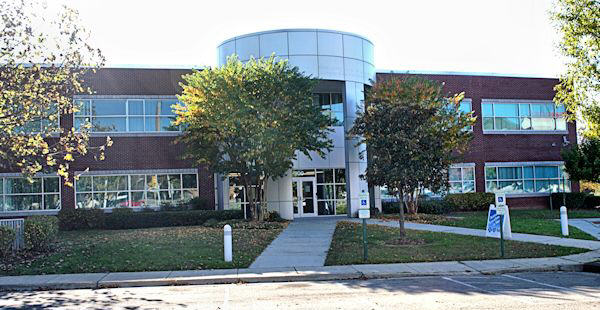Raleigh’s Chief Information and Community Relations Officer Gail Roper faced some tough questions Monday night when she appeared before the South Central CAC to discuss the future of what is being called the 900 South Wilmington Incubator.
Once home to the Raleigh Business & Technology Center, the center came under fire last summer when a city audit turned up serious problems with the nonprofit organization’s financial records. Among the issues were delinquent payroll taxes and $940 in unexplained payments made to the center’s director, Robert Robinson.

City of Raleigh
In addition to the payments, Robinson received nearly $4,000 in loans from the RBTC, and a group he co-founded received a $290,000 fee for services rendered. Robinson also failed to renew the organization’s tax-exempt status with the IRS – for three years running.
Robinson resigned from his position June 30, 2013, days before the city issued its scathing report.
The center first opened in August of 2000, after the city received a $500,000 federal grant and put up $907,00 of taxpayer money.
RBTC was to use the center as a business incubator that would primarily service southeast Raleigh, renting about 30 offices for small businesses at below-market rates and offering them shared services such as Internet access and a conference room.
The initial goals of the center, specifically the intent to serve southeast Raleigh residents, were the topic of much discussion at Monday’s CAC meeting.
“I reckon the question is, is this a tool now for southeast Raleigh or is this a tool for all of Raleigh?” said Dan Coleman, chair of the South Central CAC. “Why are we losing this tool that we had?”
CIO Roper responded, “I don’t think that there is a loss.”
Moving Forward
Roper plans to issue a Request for Information (RFI), soliciting organizations with a desire to run the incubator. The RFI is the first step in re-opening the facility.
The city released a document July 1 that listed examples of what kind of issues potential respondents would need to address. These included a determination of which entrepreneurial segments would benefit most from an incubator space and finding out the “true demand” for minority incubator space.
Coleman noted that the community initially had an important role in how the incubator was run, but felt the city’s attempts to re-open the space were dismissing community members from their former role and replacing them with city staff.
Roper said locals could help shape the future of the incubator by attending community forums and offering their input.
“We have a pledge to make sure it is an inclusive process,” Roper said. “Before we move forward with the Request for Information, we want to ensure that we have input from community.”
At Monday’s meeting, Roper said she wanted small and minority businesses to be on a level playing field.
Coleman countered that the issue was not about minority businesses in particular, but low-wealth businesses in general.
“We have a lot of low-wealth businesses in southeast Raleigh that may have a laptop or a smart phone, and a lot of them just need an office space,” he said.
Coleman said the area had lost a number of institutions over the years, such as the YMCA, and they didn’t want to add the business and technology center to that list.
Roper said one of the stipulations of the federal funding received for the project is that the building remains an incubator until 2017.
“After that, it can be used for whatever,” Roper said.
The city has announced it would like to receive market-rate prices for the space, something unlikely to happen with a traditional incubator model.
Enlisting City Council
In the meantime, Coleman remains skeptical of the city’s plans to rework the incubator.
He made a motion that “The business and technology center will stay on task with its original intent, that it was going to commit to serving southeast Raleigh and the surrounding area.”
The motion was seconded and unanimously approved by the CAC.
Coleman used the motion as a way to call out Councilman Eugene Weeks, who, alongside city manager Ruffin Hall, was also in attendance that night.
“If our Councilman is not going to sit here and tell us that he thinks it’s a tool he needs in his toolbox to be able to lift his district up, who cares after this point,” Coleman said.
“Either we have it or we don’t, none of us are going to fight if it’s not something [Weeks] believes in.”
Weeks said once he gets enough information from “the intelligent people here,” he will “go to the table with this.”
“The southeast Raleigh community wants to look to Weeks as far as questions we have concerning this, we want to hold him accountable for this, we’re asking to provide leadership on it,” Coleman said.
“The reason [RBTC] went south is because we were disengaged, thinking someone else was minding the store,” he said.
Learning From The Past
Roper emphasized a number of times throughout the night that the city would look at specific metrics to evaluate the effectiveness of the new incubator.
“What we want to do going forward is have clear indicators how we measure success – the number of jobs created, the number of businesses created, how it affects our youth in terms of entrepreneurship,” Roper said.
Among the problems cited in last year’s audit was a noted lack of information collected to assess the program’s effectiveness.
The audit stated, “A business incubator should collect sufficient information so that it can periodically perform comprehensive evaluations of the effectiveness of its programs.”
Although the city is still determining which factors it will use to measure its success, Roper said these indicators would be “appropriate to the goals we are setting for the incubator.”
